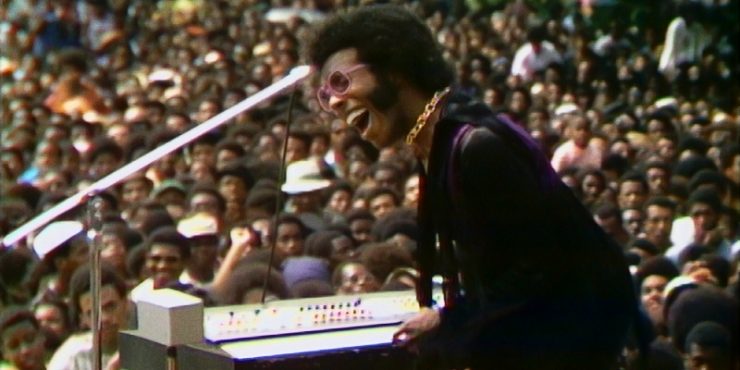The opening shot of Amir “Questlove” Thompson’s stirring documentary Summer of Soul is of a clapboard directly in front of the camera, moments before an interview is set to begin. Under ‘title’, the clapboard reads “Black Woodstock”, which is a common nickname of the Harlem Cultural Festival, a concert series in the Summer of 1969, taking place over six weekends, showcasing various Black performers of the day. This was the same Summer of Woodstock, which has been minted as one of the seminal concert festivals of the Twentieth Century. Why is Woodstock so historically relevant while the Harlem Cultural Festival has lived obscurely in the back pages of music history? This is one of many questions that Questlove addresses, but first and foremost, he is interested in showcasing these unbelievable, under-seen performances.
In his directorial debut (the credit reads “A Questlove Jawn”), Questlove makes something that is part concert film, part social documentary. A film that speaks to the spiritual and healing power of music, while also emphasizing the importance of uncovering hidden histories. The entire Harlem Cultural Festival was filmed with a professional television crew, and yet, the footage sat unseen for nearly half a century. The performances of Stevie Wonder, Nina Simone, Sly and the Family Stone, in and of themselves, would have made a tremendous movie. Yet Questlove is digging deeper here, creating a context for these wondrous performances, and adding gravity to the astonishing displays of Black talent.
Created by the flamboyant night club singer and political maneuverer Tony Lawrence (a quick montage of his outfits is one of Summer of Soul‘s many treats), the Harlem Cultural Festival took place the year after the assassination of Dr. Martin Luther King Jr. and the Harlem riots it inspired. Summers in Harlem – Manhattan’s legendary black neighborhood – had become synonymous with police violence. They were rife with a racial tension brought on by the turbulent 60’s further pressure cooked by oppressive heat. Lawrence’s goal was to make a concert festival that took advantage of the Black Power movement, showcasing several generations of music in a concert that all ages could enjoy. A lot of Harlem residents – several of whom give interviews in the film – were able to simply walk to Mount Morris Park and (for free) see some of the biggest recording artists of the day.
Meant to be a balm against the trauma of watching the assassinations of MLK, Malcolm X and the Kennedys, the festival festered uncommon joy for thousands of Black Harlemites. One of the many great things about Summer of Soul is that it does not shy away from the violence and oppression that many Blacks felt during the 60’s, but it holds its main focus on the unbridled thrill of the concert. Whether it be the political dynamism of Sly Stone and Nina Simone, the gospel powerhouse of Mahalia Jackson and Mavis Staples, or the unfiltered spirit of Stevie Wonder, Questlove’s main goal is to showcase the full scope and power of Black music, and its esteemed place within the Black community. In one moment we have BB King playing unvarnished blues, and the next there’s the swelling production of The 5th Dimension, all to see for a crowd of thousands.
The subtitle to Summer of Soul is (…Or, When The Revolution Could Not Be Televised). There is a coda at the end of the film that explains how this incredible footage was buried, another victim to the systemic erasure of Black history. In interviews with attendants decades later, you get to see the wonder in their eyes as their memories are confirmed. Yes, this concert did indeed happen. It’s obvious why footage from the “Black Woodstock” would be considered useless in 1969, as much as that might seem ludicrous today. In uncovering this, Questlove sends the audience on a truly emotional experience. It is yet another testament to the sheer strength of the Black community in the face of perpetual oppression, but it is also a display of uncommon talent and beautiful music. Summer of Soul holds those two facts in its hands simultaneously and throughout, and never lets go.
Directed by Ahmir “Questlove” Thompson










